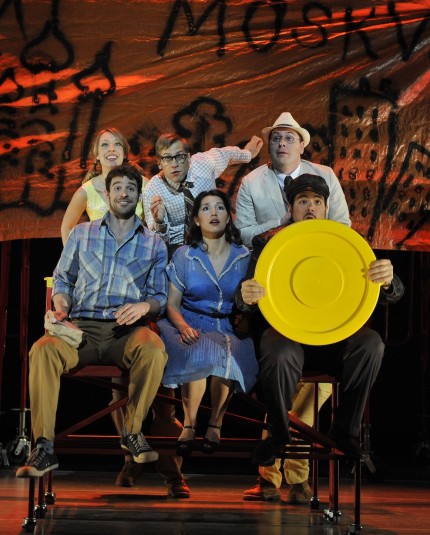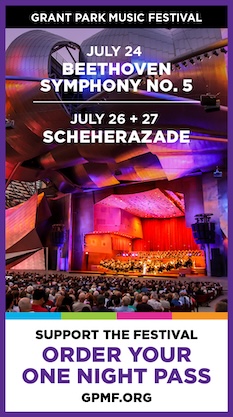COT’s young cast and lively production shine in Shostakovich’s charming “Moscow, Cheryomushki”

It’s ironic that a musical about the Soviet housing crisis and shoddy construction was nearly done in Saturday night by a malfunctioning elevator.
One hour before the curtain of Chicago Opera Theater’s season-opening performance of Shostakovich’s Moscow, Cheryomushki, the Harris Theater orchestra-pit elevator broke, rendering it inoperable for Saturday’s performance. The artistic staff had to scramble and quickly relocate the musicians at the back of the stage behind the sets with some on-the-fly adjustments to the stage action as well. As Jerry Tietz, director of artistic administration, put it in his remarks explaining the situation, “Ladies and gentlemen, this is live theater at its livest.”
Considering the last-minute chaos, the show went on with minimal visible distractions. The chamber orchestra had somewhat less presence but not enough to affect the performance and the cast gamely carried on even with conductor Alexander Platt invisible to the singers at the back of the stage. The only obvious glitch was a loud mechanical clicking that repeatedly intruded on the quiet moments in Act Two.
Operetta was a guilty pleasure for Shostakovich and his Moscow, Cheryomushki became an unlikely hit in the Soviet Union in 1958. The romantic comedy concerns a group of Muscovites looking for apartments during the postwar Soviet housing crisis, specifically four couples trying to secure flats in the new development of Cheryomushki.
Moscow, Cheryomushki inhabits a different universe from the bleakness and death-head desolation of Shostakovich’s familiar symphonies and string quartets. The style hovers between operetta and musical theater, crafted in the light, populist vein of Shostakovich’s jazz suites, with snappy songs, ensembles, dance numbers, and lively choruses, often mining—and satirizing—material that would have been familiar to Russian audiences of the day.
Gerard McBurney’s reduction of the score from a huge Soviet orchestra to chamber ensemble takes its instrumentation from Shostakovich’s jazz suites and is done with consummate skill and sympathy.
Meg Miroshnik’s new libretto for this production proved more of a mixed bag. She was consistently inspired in matching lyrics to the music, yet somewhat less successful in the dialogue. Her free translation often took too liberal a hand with its jarring American colloquialisms. Also Lusya’s repeated straight-faced exhortations to the Cheryomushki residents’ “Collective Will” sounded more hollow and propagandistic than anything in the ironic, wryly subversive original. If anything, beneath the surface froth Moscow, Cheryomushki remains relevant in its message that people have a right and responsibility to stand up to entrenched bureaucracy and a government—any government—that seeks to forcibly impose its will and strip away their freedoms.
Anya Klepikov’s effective unit set offers a pair of three-story scaffolding towers symbolically painting the wedding-cake architecture of the era enhanced by her roll-on sets and colorful period costumes. Mike Donahue’s imaginative direction was an object case in making something out of minimal resources with Donahue investing his cast with a comic energy and youthful enthusiasm that largely carried the production through its nearly 180 minutes. (The last half-hour runs out of steam with an anticlimactic thud of a final scene that clearly needs some work.)
As Boris, the cynical ladies’ man who just wants to marry a woman with an apartment but unexpectedly falls for the prim museum guide Lidochka, Paul LaRosa sang well if overdoing the American swagger a bit too much, seeming more like an overgrown frat-house jerk at times than a likable hero. He showed some impressive physicality with his Russian dance moves, something they don’t teach you at the music conservatory.
Following up her impressive COT debut last year in Death and the Powers, Sara Heaton provided some of the best singing of the evening as the intellectual tour guide, Lidochka. She delivered her patter song about her extensive education with pinpoint clarity and precision and brought expressive depth to her melancholy aria when she and Boris have parted. The audience went wild over the extended dance sequence for her and LaRosa, with enthusiastic applause that literally stopped the show.
Dominic Armstrong was a consistently engaging presence as Boris’s shy chauffeur friend Sergei, showing ease in the musical vernacular and singing sweetly with his high tenor. As the construction forewoman Lusya, the object of Sergei’s affections, Sophie Gordeladze sang with a gleaming voice in her Act 2 aria. Her cardboard character suffered the most in this new libretto, though the Georgian soprano showed personal courage in repeatedly climbing the side stage ladder to reach her “crane” high atop the Harris stage.
As the randy newlyweds Sasha and Masha, Adrian Kramer and Emily Fons provided spirited comedy and worthy singing, Fons’ high mezzo heard to particularly fine effect. Paul Scholten, as Lidochka’s displaced father Semyon, provided one of the vocal highlights with his nostalgic aria about old Moscow.
As Drebednyov, the Soviet apparatchik who uses his “connections” to steal an apartment for his wife Vava, Matt Boehler proved a worthy comic villain and Ashleigh Semkiw was a hoot as his manipulative sexpot wife. Paul Corona was perfect casting as Barabashkin, the put-upon superintendent of Cheryomushki, singing with a booming bass-baritone and faultless comic timing.
Choreographer Eric Sean Fogel provided some lively moves for the singers who energetically threw themselves into the dance routines as well as more sophisticated ballet for the superb corps of professional dancers (Nebi Berhane, Jennifer Goodman, Craig Kaufman, Todd Rhoades and Teanna Zarro).
All credit to Alexander Platt and the orchestra who had to quickly convert themselves into an on-stage banda. Even with that last-minute retooling, Platt and his 14 musicians put across Shostakovich’s engaging score with terrific verve, brash energy and wit.
Don’t let the title and unfamiliarity put you off. Even with quibbles, Moscow, Cheryomushki is a hugely enjoyable evening for fans of opera as well as musical theater. There are only three more performances, so don’t wait to snap up a ticket. It’s unlikely that this delightful musical will come your way again.
Shostakovich’s Moscow, Cheryomushki will be repeated April 20, 22 and 25. chicagooperatheater.org; 312-741-8414.
Posted in Performances
